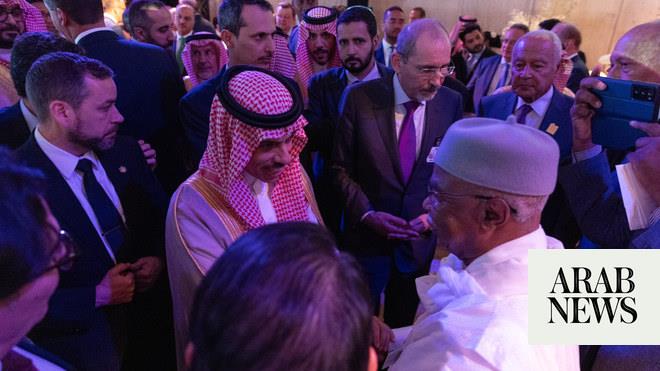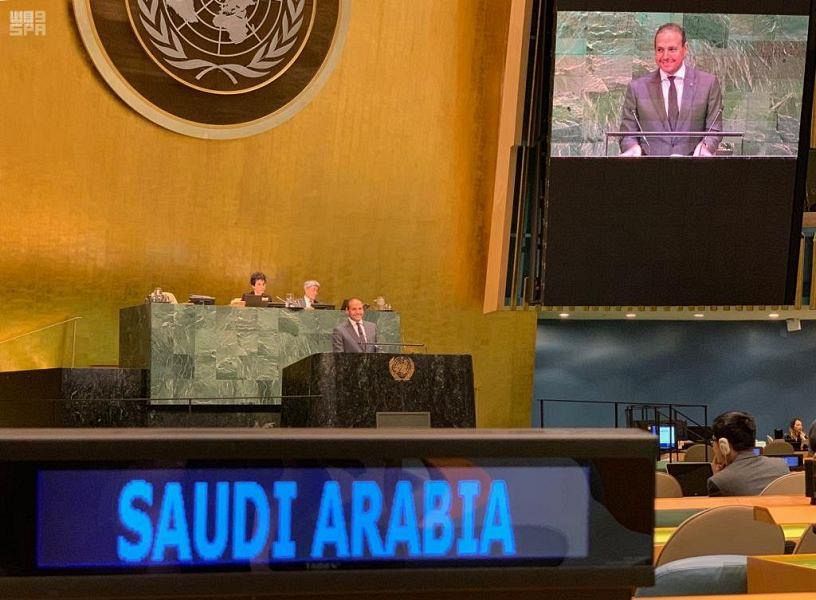
Day two (Wednesday) of the plenary sessions at the UN General Assembly is now under way
NEW YORK: Saudi Arabia is in consultation "with friends and allies about the next steps to take" after an attack on Sept. 14 on the world"s biggest crude oil processing facility, but is waiting for the findings of an investigation, Saudi Arabia"s Minister of State for Foreign Affairs Adel Al-Jubeir told reporters on Wednesday.
"The United Nations sent people to be part of the investigation, other countries have sent experts to be part of the investigation so when the team that’s investigating has concluded its investigations we will make the announcements publicly," he said on the sidelines of the annual gathering of world leaders at the UN.
He also said that Iran"s attack on Saudi Aramco facilities "cannot go answered" and that there had to be "consequences for what they did."
Elsewhere, Iraq"s president Barham Salih told the Assembly that Iran"s ongoing "malign activity" in the Middle East region had to stop and condemned the recent targeting of Saudi security, adding that Gulf security is “vital” to Iraq.
To follow how day one unfolded, scroll below...
-------
21:00 - And that is that for day two. Check back with Arab News for a round up of Wednesday"s action.
20:45 - Saudi Minister of State for Foreign Affairs, Adel Al-Jubeir, said that the Kingdom is investigating and consulting with all parties, and will work to respond to the attacks against the oil installations in Abqaiq and Khurais.
Al-Jubeir was speaking during a joint press conference with the United Nations Coordinator for Humanitarian Affairs and Emergency Relief Marc Lowcock, on the sidelines of the 74th United Nations General Assembly in New York.
"We are considering political, economic and military options against Iran, after the investigation is over. This regime must change for the benefit of the Iranians before anyone else," Al-Jubeir said.
18:15 - Don"t forget to check out Arab News" special spotlight for the UN General Assembly or the latest stories, including the US decision to impose sanctions on Chinese entities for their dealing with Iran announced earlier on Wednesday by US Secretary of State Mike Pompeo.
READ MORE: SPOTLIGHT - UN General Assembly 2019
US slaps new sanctions on Chinese entities over Iranian oil
17:10 - Saudi Arabia"s minister of state for foreign affairs Adel Al-Jubeir spoke on the sidelines of the Assembly earlier on Wednesday with Mark Lowcock, UN Relief chief, about the humanitarian situation in Yemen. He said the Kingdom had donated $14 billion to supporting Yemen since the hostilities began, and that Saudi Arabia was committed to working with the OCHA to continue its humanitarian efforts in Yemen.
He added the Kingdom will continue to help as much as possible "its Yemeni brethren" as well as the work of the UN envoy Martin Griffiths.
Lowcock said at the seminar, that Yemen is the world’s largest humanitarian crisis, but also it also constitutes the UN’s biggest humanitarian operation, which only happens because of generous donations from countries like Saudi Arabia.
He said the UN"s relief efforts are reaching 11 million people per month.
16:20 - Iran"s president Hassan Rouhani admits that US sanctions have affected the Islamic Republic"s economy, but that the Iranian regime will never agree to negotiations with Washington about its nuclear program if it is under pressured conditions.
16:00 - Away from the main hall, and on the sidelines of today"s plenary session, the Saudi Arabian foreign minister Ibrahim Al-Assaf met with Russia"s FM Sergei Lavrov to discuss bilateral relations and "areas of common interest."
15:25 - Michel Aoun, Lebanon"s president, now addresses the audience.
Aoun decries the impact of conflict in the Middle East region, and how its people always end up paying the price - economically, socially, with their security and peace - and how the displacement of peoples in Syria and Palestine is having a huge impact on Lebanon"s own security, political, social, economic and environmental development.
14:40 - Iraq"s president Bahram Salih takes to the podium to address the General Assembly audience.
The Iraqi president makes a thinly-veiled reference to Iran"s ongoing malign activity in the Middle East region, by condemning the recent targeting of Saudi security, adding that Gulf security is “vital” to Iraq.
Salih said he wanted to make sure that Iraq would not be a starting point of aggression against neighboring countries and that the solution to tensions in the regions is based on non-interference in internal affairs of other countries.
He also thanks the international community for its efforts in helping Iraq overcome terrorism.
14:30 - Romania"s president takes to the podium, as we await the address from Barham Salih, which gives us time to look at one of the biggest talking points from day one"s meetings - Iranian president Hassan Rouhani talking with leaders from the UK, France and Germany.
Boris Johnson raised "deep concern" about Iran"s destabilising activity in the region, including the attacks on the Aramco oil facilities, and insisted it must stop. Along with Emmanuel Macron and Angela Merkel, he stressed support for the Iran nuclear deal and the need for dialogue, "including on a comprehensive successor deal."
Macron said he believed that the conditions for the leaders of the United States and Iran to meet were now in place, but it was still up to them to decide whether to move forward.
Merkel said that Iran"s demands for US sanctions relief were "unrealistic." She said: "I would naturally be happy if there were talks between the United States and Iran," but dismissed Iran"s demands that us lift all its sanctions before any high-level talks can take place.
14:00 - US Secretary of State Mike Pompeo makes an address on the sidelines at a United Against Nuclear Iran panel. He says the economic pressure US is putting on Iran has prompted them to resort to sabotage attempts in the region, including the attacks on Saudi Aramco, and their actions are increasing the risk of conflict in the region.
Pompeo adds that US action against Iran has drawn international attention to the country"s constant threat to peace, and that many countries are now ready to face its threats to regional navigation and international security.
Pompeo also announced sanctions on Chinese companies, saying: "Today we"re imposing sanctions on certain Chinese entities for knowingly transporting oil from Iran contrary to United States sanctions." Read the full story here.
13:45 — Good afternoon. Key speakers for today include Barham Salih, president of Iraq, Iran"s president Hassan Rouhani and Michel Aoun of Lebanon. Later on Wednesday, we"ll hear from the Libyan Council of National Accord president Faiez Mustafa Serraj and the prime minister of Kuwait Sheikh Jaber Al-Mubarak Al-Hamad Al-Sabah.












